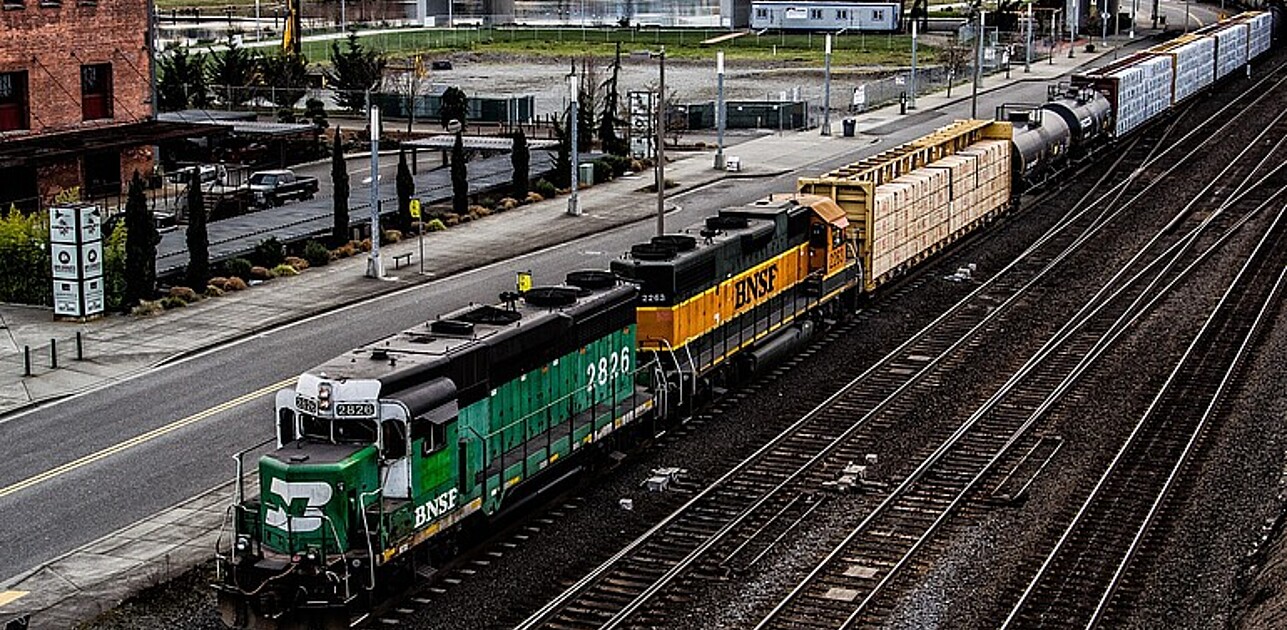

Article: Tuesday, 11 August 2020
CO2 and greenhouse gas emissions are on the list with the most pressing challenges worldwide. The transportation sector represents almost a quarter of Europe's greenhouse gas emissions and is the main cause of air pollution in cities, with road transport being by far the biggest emitter. Shifting to more sustainable transportation modes is challenging to operationalize in practice. The complexity of synchronizing rail and road shipments calls for the development of a new generation of algorithms that can deliver fast, cost-efficient support to decision makers. In a recent paper, Dr Ioannis Fragkos and Prof. Rob Zuidwijk from Rotterdam School of Management, Erasmus University (RSM) and Dr Joris Wagenaar from Tilburg School of Economics and Management developed customised algorithms that suggest cost-efficient operational decisions, encourage the use of sustainable transportation modes (such as trains) and cope with customers who demand strict on-time deliveries.
Transportation services need to deal with an increasing customer demand, stricter requirements for on-time delivery, disruptions and travel delays and an urge to become more sustainable. Companies try to address some of these requirements by taking kilometres off the road, thereby switching to more sustainable modes of transportation, for example rail roads. Such a transition has been slow and challenging: shipping professionals who need to satisfy these multiple objectives are confronted with complex operations.
The researchers suggest a mathematical model that captures the complexity of these operations, and which takes into account travel disruptions, customer delivery requirements and scheduled rail and road shipments while minimizing the corresponding costs. The model cannot be solved with existing approaches, so they developed a novel state-of-the-art procedure. Finally, they show that by having customers with varying levels of delivery requirements it is possible to accommodate requirements for timely deliveries. When such requirements are extremely strict, the resulting inflexibility carries a disproportionate impact on the corresponding cost, as it calls for the deployment of a larger number of transportation resources.
The model is benchmarked against other conventional approaches and it generates significantly more cost-efficient alternatives. The model is also leveraged to quantify:
The impact of disruptions on the rail network on cost
The impact of having customers with demanding delivery times
The impact of operating a portfolio of customers, who have different degrees of flexibility with respect to delivery dates.
Perhaps surprisingly, having many customers with relatively strict on-time delivery requirements is not always a problem: their co-existence with more flexible customers gives the overall schedule an immunity over delayed deliveries, in case there are disruptions across the rail networks. However, even a small number of extremely demanding customers can lead to a disproportionate increase of operational costs, because additional resources need to be committed for them in advance, in case major disruptions occur.
Third-party-logistics professionals manage complex operations that require disciplined day-to-day planning and mid-term capacity planning that carries significant costs. Managers are confronted with daunting complexity such as customer demand, requirements for timely delivery and the pressure to increase sustainable transportation.
This research lays the methodological foundations for a new generation of decision support systems that will be able to accommodate such complexities. Also, the insights regarding the influence of on-time delivery requirements on cost is practical knowledge for professionals who want to efficiently serve their customers: it is perhaps best to have dedicated resources for extremely time-sensitive customers, and otherwise cluster customers in a portfolio as diverse as possible, allocating them transportation resources.
The key focus of this research focus is on the mid-term planning of such operations. In a follow up study, the researchers plan to investigate this problem from a strategic perspective. In particular: how much transportation capacity should a shipper reserve at the beginning of the year to accommodate demand for the entire year? Reserving too much capacity will result in high capital costs, while not reserving enough capacity may result in customer dissatisfaction, last-minute renting decisions and high cost and lost demand. The study will strike a balance in this trade-off and minimize the corresponding costs in combination.

Read the full paper Integrated planning for multimodal networks with disruptions and customer service requirements published in Transportation Science (STAR).

RSM offers Executive Education and Master programmes in various business areas for any stage of your career. For instance:

Science Communication and Media Officer
Rotterdam School of Management, Erasmus University (RSM) is one of Europe’s top-ranked business schools. RSM provides ground-breaking research and education furthering excellence in all aspects of management and is based in the international port city of Rotterdam – a vital nexus of business, logistics and trade. RSM’s primary focus is on developing business leaders with international careers who can become a force for positive change by carrying their innovative mindset into a sustainable future. Our first-class range of bachelor, master, MBA, PhD and executive programmes encourage them to become to become critical, creative, caring and collaborative thinkers and doers. www.rsm.nl
For more information about RSM or this article, please contact Danielle Baan, Media Officer for RSM, via +31 10 408 2028 or baan@rsm.nl.
